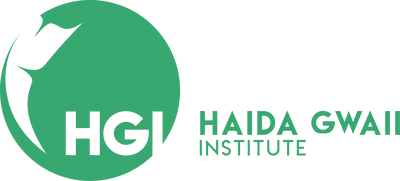Suudhl Cindy Boyko, Co-Management

Suudhl Cindy Boyko has served as the Haida Nation co-chair on the Gwaii Haanas Archipelago Management Board for the past twenty years, where she has overseen the signing of the Gwaii Haanas Marine Agreement and establishment of Gwaii Haanas National Park reserve, National Marine Conservation Area and Haida Heritage Site, the raising of the Legacy Pole at Hlk’yahGawGa Windy Bay and signing of the Gina ’Waadluxan KilGuhlGa Land-Sea-People Management Plan. Cindy sat as an elected representative on the Council of the Haida Nation for nine years and, prior to that, was manager of the Haida Gwaii Watchmen Program. She is also a member of the Haida Gwaii Institute’s Advisory Council.
Dr. Hilary Thorpe, Co-Management

Hilary has over 20 years of experience working and teaching in the fields of natural resource management and co-management. She holds a Ph.D. in Forestry from the University of Toronto and currently serves as the Manager of National Marine Conservation Area Establishment for the Pacific Region at Parks Canada. In this role, Hilary leads a team working collaboratively with First Nations governments and the Province of British Columbia to advance new marine conservation area proposals. Hilary joined Parks Canada in 2012 as a marine planner providing technical support to the Archipelago Management Board, the co-governance body that manages Gwaii Haanas National Park Reserve, National Marine Conservation Area Reserve, and Haida Heritage Site. During her time at Gwaii Haanas, she co-led development of the Gina ‘WaadluXan KilGuhlGa Land-Sea-People Management Plan. Deeply committed to education and lifelong learning, Hilary has been an instructor with the Haida Gwaii Institute since its founding. She lives with her partner and children in Revelstoke, BC, in the territories of the Sinixt, Ktunaxa, Secwépemc, and Syilx First Nations.
Dr. Ella-Kari Muhl, Co-Management

Ella is an interdisciplinary marine scientist with interests in equity, co-production of knowledge, and the sustainable governance of marine resources. She is postdoctoral research fellow with the Vulnerability to Viability Global Partnership for Small-Scale Fisheries, University of Waterloo, Canada and co-PI and Project Lead for the Blue Tenure Transitions initiative at the University of Cape Town. She has taught and written on issues of coastal governance, marine conservation, knowledge co-production and fisheries, with over ten years of progressive inter- and transdisciplinary research and professional practice in the areas of conservation, indicator development, ecosystem-based management and sustainability assessment in diverse contexts.
Dr. Bruce McIvor, Law and Governance

Dr. Bruce McIvor is a partner at First Peoples Law LLP. His work includes both litigation and negotiation on behalf of Indigenous Peoples across Canada. Bruce is recognized nationally and internationally as a leading practitioner of Aboriginal law in Canada. His collection of essays entitled Standoff: Why Reconciliation Fails Indigenous People and How to Fix It was published in the fall of 2021. His new book, Indigenous Rights in One Minute: What You Need to Know to Talk Reconciliation, was published in May 2025. Bruce is a member of the Manitoba Métis Federation.
Giovanna de Oliveira Andreotti, Strategies for Creating Change in Complex Systems

Giovanna de Oliveira Andreotti is a UBC alumnus with a bachelor’s in Psychology and a further interest and certification in educational psychology and climate psychology from CIIS. She is also a commercial dancer, choreographer, and dance teacher, working in television and film alongside her journey in academia. She is a member of the Gesturing Towards Decolonial Futures, an arts and research collective where her work revolves around intergenerational relationships, climate change, and education.
Stacey Austinson, Strategies for Creating Change in Complex Systems

Stacey Austinson is a First Nations relations consultant and entrepreneur of St’at’imc and W̱SÁNEĆ ancestry. Stacey is an advocate for indigenous resurgence, empowerment, and equality. She specializes in indigenous planning, strategic leadership advisory, community and nation engagement and facilitation, relations building and internal and external reconciliation approaches.
Her unique perspective, is partially attributed to the invaluable immersion in First Nations leadership teachings, cultural knowledge and ways of being and knowing at the senior leadership and management levels. She has been entrusted to take on diverse responsibilities in her career from Negotiation Advisor to Acting Executive Director to the St’át’imc Chiefs Council to Implementation Manager of the historical St’at’imc BC Hydro Settlement Agreement.
Her approach, experience, knowledge and education had earned her positions to lead and advise a number of initiatives, projects, strategies, collaborations, discussions and negotiations in nation-to-government, nation-to-corporate, nation and community spaces. Specifically in rights and title, nationhood, stewardship, culture and heritage, health and education.
Stacey has worked at the interface of indigenous and western knowledge systems for over 20 years.
Beyond her Associate Arts Degree from Thompson Rivers University, Stacey has been (is) very deliberate in structuring and personalizing her own higher education strategy with certifications and training in Nation Rebuilding, Project Management, Research Ethics, Ethical Relations with Indigenous Communities, Indigenous Focused Public Relations, Aboriginal Law and Governance and Co-Management. She continues to curate her own unique skill and knowledge tool kit.
Stacey is a proud graduate of the Haida Gwaii/UBC Co-Management of Natural Resources micro certification program. And very honored to co-facilitate the Strategies for Creating Change in Complex Systems.


